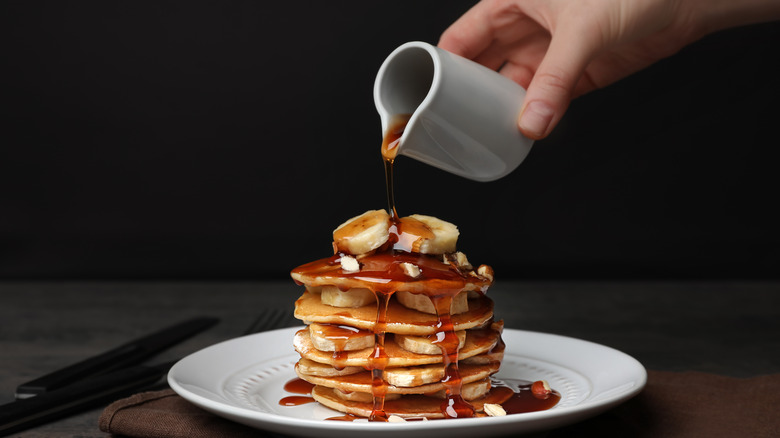The Unexpected Effect Maple Syrup Has On Your Blood Sugar
Maple syrup is a popular choice for drizzling atop pancakes, waffles, and French toast. It's a common sweetener in recipes and is often added to seasonal drinks for a maple flavor. But how does maple syrup actually affect our blood sugar?
Blood sugar, also called blood glucose, is created by our bodies as carbohydrates are broken down and turned into sugar, releasing it into the bloodstream (via Healthline). This is used for energy, and whatever isn't used gets stored in the cells to be used later. Those with diabetes lack the ability to easily unlock the cells, leading to high levels of glucose in the bloodstream. If high blood sugar goes unmanaged, it can lead to issues with the heart, kidneys, eyes, and blood vessels.
Different types of carbohydrates raise the blood sugar at different speeds and amounts (via Harvard T.H. Chan School of Public Health). The categorization of these foods is called the glycemic index, which rates foods from 1-100. Foods with a high glycemic index are digested quickly and cause blood sugar spikes. Low glycemic foods, however, are digested slowly, creating a gradual rise in blood sugar. Glycemic index is affected by the fiber content, processing, ripeness, fat and acid content, and whether the food is left in its whole form or broken down.
What does maple syrup do to blood sugar?
Maple syrup has a high glycemic index, coming in at about 54 (via Healthline). Regular white sugar is about 65, so while maple syrup has a lower glycemic index than table sugar, it's still going to be absorbed into the bloodstream very quickly. It's also important to note that there's a difference between real maple syrup and corn syrup that's maple flavored, which is what many cheaper kinds are.
Since maple syrup is a liquid and has no fiber content, this means that it will be digested quickly and cause blood sugar and insulin spikes (via WebMD). Therefore, people with diabetes may not do well consuming this sweetener. In fact, eating many high-glycemic-index foods could lead to heart disease, obesity, and possibly ovulatory infertility and colorectal cancer (via Harvard T.H. Chan School of Public Health). A better option would be carbohydrates that include fiber and are digested more slowly, such as whole vegetables and fruits, beans, nuts, and whole grains. These foods have glycemic indexes of less than 20, so blood sugar will rise more gradually.


